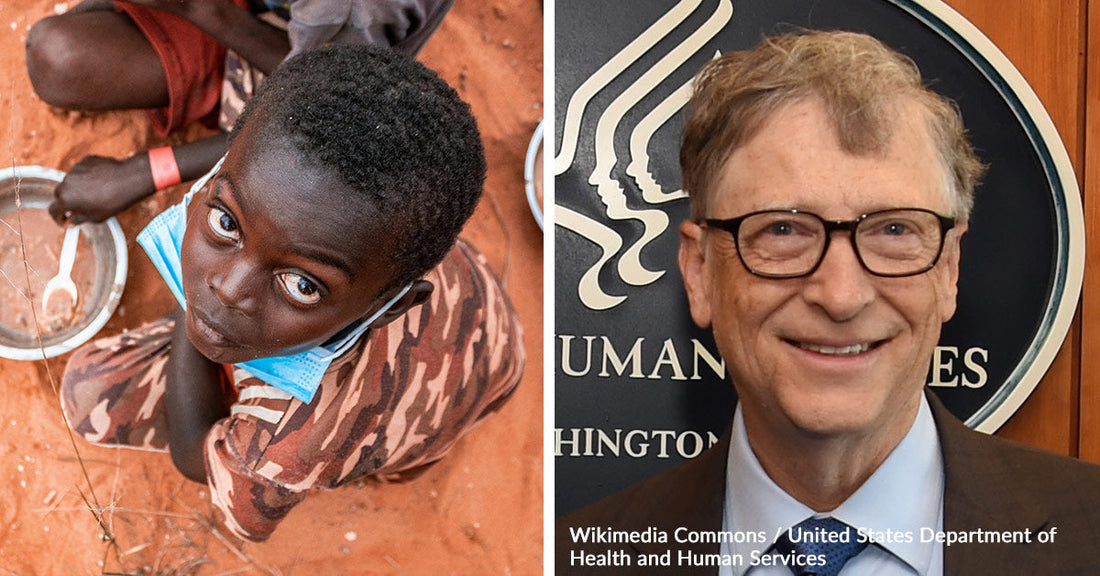Bill Gates Pledges His Entire Fortune to Save Millions of Lives
Matthew Russell
Bill Gates is on a mission to give away nearly everything he has. By 2045, the billionaire philanthropist says his foundation will have spent $200 billion—most of it in Africa—on a final sprint to end preventable child and maternal deaths, eliminate diseases like polio and malaria, and lift millions out of poverty.
Speaking from the African Union headquarters in Ethiopia this year, Gates told a packed audience of health officials, technologists, and policy leaders that his vision for the next 20 years centers on “unleashing human potential through health and education.”
According to BBC News, Africa is not just the focus of Gates' philanthropic strategy—it’s the future of global development.

Photo: Wikimedia Commons / United States Department of Health and Human Services, License: Public Domain
Bill Gates pledged to give away 99% of his wealth by 2045.
From Strategic Philanthropy to Global Health Infrastructure
The Gates Foundation’s footprint on public health is already enormous. Since its inception in 2000, it has given away over $100 billion, supported mass immunization efforts, funded groundbreaking research, and created new global partnerships.
The Grand Challenges in Global Health initiative, launched in 2003, helped shape national priorities at the NIH, drawing more than 1,000 applications and directing funding toward neglected diseases such as malaria, HIV, and tuberculosis. These efforts redirected over $1 billion in public research dollars toward issues that had long been underfunded, as reported by EMBO Reports.
The Foundation’s strategy has consistently focused on measurable impact. From pushing needle-free vaccine delivery to investing in AI-assisted prenatal care in Rwanda, its approach blends risk-taking with a demand for results. Researchers who received Grand Challenges grants were required to hit milestones and develop plans for affordable global access. It was a new model—results-driven, innovation-heavy, and global in ambition.

Photo: Wikimedia Commons / United States Department of Health and Human Services, License: Public Domain
Gates' personal fortune is expected to reach $200 billion.
Targeting Africa in a Time of Uncertainty
In May, Gates confirmed he would accelerate his giving and sunset the Foundation by December 31, 2045.
“There are too many urgent problems to solve for me to hold onto resources that could be used to help people,” he wrote on his blog.
According to Reuters, Gates expects his net worth to reach $200 billion by then, and 99% of it will go to improving health and education, mostly in Africa.
He’s taking this step amid a growing global retreat from foreign aid. The U.S., once a cornerstone of international public health funding, has slashed its support for agencies like USAID under policies driven by Elon Musk’s Department of Government Efficiency (DOGE). Gates criticized these cuts, warning they would trigger a devastating reversal in progress and a surge in mortality.
“The number of deaths will start going up for the first time,” he told Reuters.

Photo: Wikimedia Commons / US Treasury Department, License: Public Domain
Gates aims to end preventable deaths of women and children.
Philanthropy, Power, and Accountability
Gates’ expanding role in global health has drawn both admiration and criticism. The Foundation’s large earmarked contributions to the World Health Organization—over $2.4 billion since 2000—have made Gates one of the most influential actors in international health policy. His priorities often become WHO priorities, raising concerns about accountability and democratic governance in global health.
As Politico notes, insiders have described him as being “treated like a head of state” at forums like the G20 and the World Health Assembly.
Critics argue that Gates’s influence can distort global health agendas, with an overemphasis on technical solutions like vaccines and diagnostics, and insufficient attention to building robust health systems. Others point to the revolving door between the Gates Foundation and pharmaceutical corporations as a potential source of bias, Grain reports.
But Gates remains unapologetic.
“The market isn’t naturally going to create a malaria vaccine,” he told Devex. “There’s just no financial reward for doing that. And yet the private sector expertise has been key to the progress we’ve made.”
A Closing Chapter, and a High-Stakes Future
The Foundation now has a 20-year sunset horizon, with a budget projected to hit $10 billion annually by 2026. The final years are expected to focus heavily on primary healthcare systems, maternal nutrition, AI for diagnostics, and vaccine delivery in low-income countries.
Whether this experiment in time-limited mega-philanthropy can sustain long-term systems change remains to be seen. Gates admits that success depends not just on money, but on governments reclaiming their role in global health.
“It’s unclear whether the world’s richest countries will continue to stand up for its poorest people,” he told Reuters.
For now, his vision is clear: Africa, and the billions of lives it holds, is where the future of public health will be decided.
Click below to make a difference and support this important initiative.

